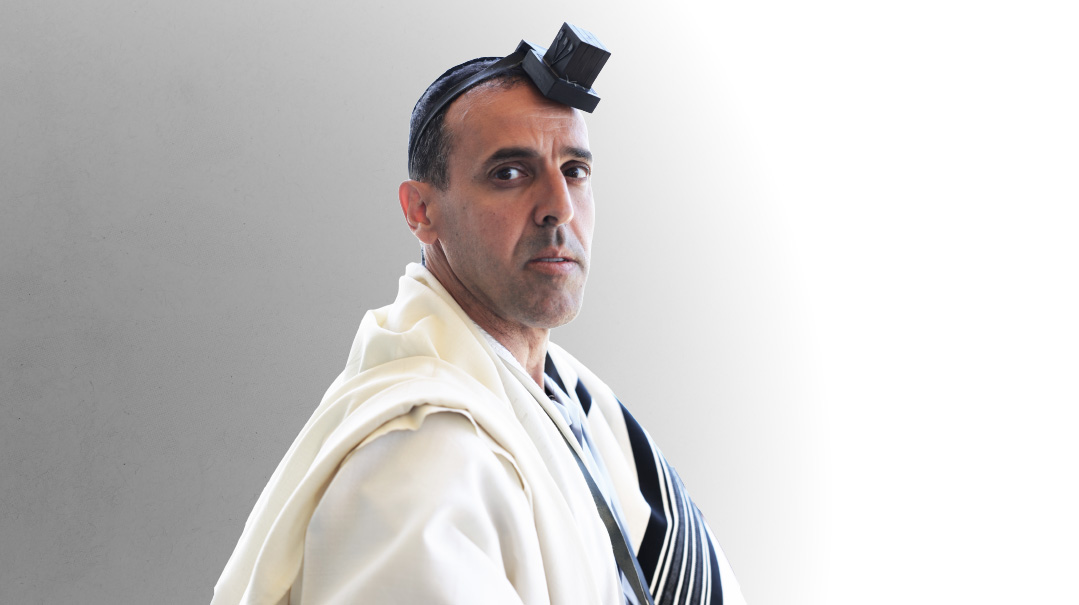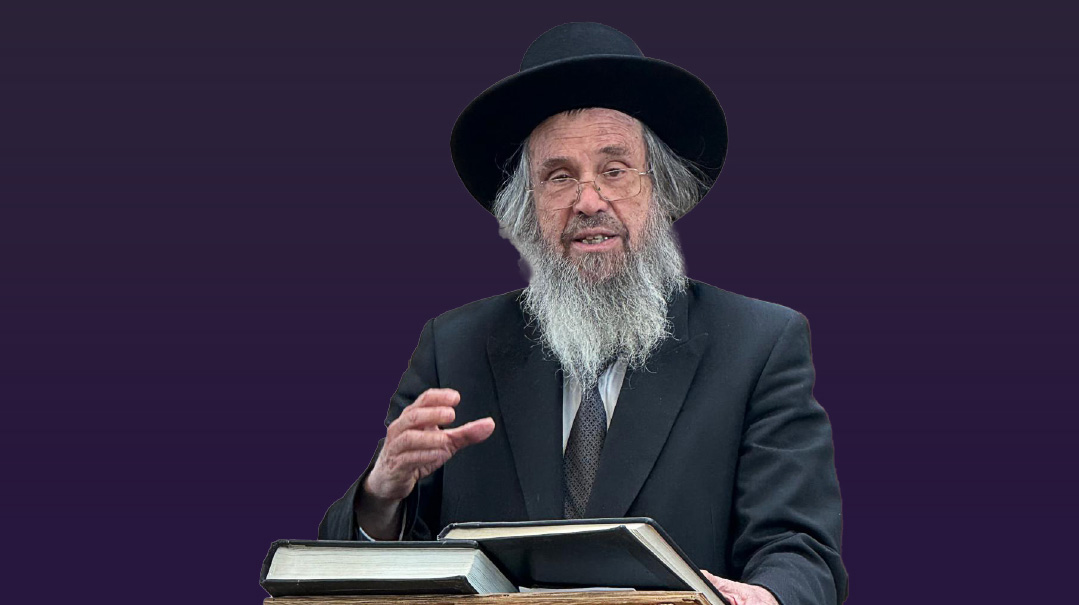The Injustice of Discrimination

Falsely accused of spying for Israel, the saga of David Tenenbaum, an Orthodox Jew from Detroit, began more then a decade ago, but justice is just beginning to be done.

David Tenenbaum is waiting for an apology.
He hopes it won’t be as long in coming as the multiyear ordeal he has gone through to clear his name, ever since he was falsely accused of having spied for Israel.
Partial vindication arrived in mid-July when the Inspector General of the United States Department of Defense issued a report saying that not only was Mr. Tenenbaum “the subject of inappropriate treatment by Department of the Army and Defense Investigative Service officials,” but that “we believe that Mr. Tenenbaum was subjected to unusual and unwelcome scrutiny because of his faith and ethnic background, a practice that would undoubtedly fit a definition of discrimination, whether actionable or not.”
The trauma that he and his family have endured, professionally and personally, since the false charges were first leveled in the 1990s both “ruined my career and put my family in danger,” said Mr. Tenenbaum, an Orthodox Jew, in a telephone interview from his home in Southfield, Michigan, a suburb of Detroit.
While the Inspector General’s report explicitly states that had Mr. Tenenbaum not been Orthodox, he would not have been subjected to such intense and protracted scrutiny, it is that very Orthodoxy and his deep emunah that enabled him to survive the ordeal and remain strong.
Groundless Suspicion
It is far from clear whether the religious discrimination Mr. Tenenbaum was subjected to in his post as an engineer in the US Army Tank-Automotive and Armaments Command (TACOM) is an isolated incident or a widespread phenomenon in the Defense Department. “There is no question that there is a perception in certain circles, that Jewish employees in the department, especially in the post-Pollard era, are being looked at with great suspicion,” says Rabbi Chaim Dovid Zwiebel, executive vice president for Government and Public Affairs for Agudath Israel of America.
Mr. Tenenbaum, a product of Akiva Hebrew Day School and Yeshivah Beth Yehudah of Greater Detroit, began working for TACOM in 1984. He was granted interim security clearance for secret matters almost immediately. For his first eight years on the job, everything appeared to proceed routinely. In July of 1992, his supervisor applied to higher-ups for permission to reassign him to Israel under an engineer and science exchange program to learn more about combat vehicle technology. He appeared to be the ideal candidate, partially due to his fluency in Hebrew.
This is when the trouble began. A suspicious coworker filed a report against Mr. Tenenbaum under the Subversive and Espionage Directed Against (SAEDA) the US Army program. “That’s what happens if, let’s say, your colleague sees something funny, calls security or the FBI, and makes a complaint,” says Mr. Tenenbaum. “In this case, the complaint was that I speak Hebrew. Keep in mind now, one main reason why I was hired initially was because of that.”
The Inspector General’s report took note of Mr. Tenenbaum’s “frequent” trips to Israel –certainly nothing unusual for an Orthodox American – and his expressed desire to collaborate with the Israeli government on a joint defense project to improve the armor on military vehicles. Besides having to converse in Hebrew on the job with Israeli colleagues, Mr. Tenenbaum stood out in other ways that are quite common to Orthodox Jews in the workplace. He would not eat with his colleagues in nonkosher restaurants, wore a yarmulke at the office, and “was devout in his faith in every respect,” according to the report.
Lurking in the background was a counterintelligence profile developed and published around this time by US Defense investigators describing Israel as a “nontraditional adversary in the world of espionage.” The profile further noted “the strong ethnic ties to Israel present in the United States, coupled with aggressive and extremely competent intelligence personnel, has resulted in a very productive collection effort.”
When the Anti-Defamation League caught wind of this and asked for a clarification, Deputy Secretary of Defense John White wrote back that the profile did not reflect the department’s official position and that “singling out ethnicity as a matter of counterintelligence vulnerability is particularly repugnant.”
Official or unofficial, repugnant or not repugnant, the handwriting was on the wall.
Five additional SAEDA reports were filed against Mr. Tenenbaum during the next four years. “The charges went from ridiculous to totally ridiculous,” he says. “One complaint said I held a ‘party’ and an Israeli liaison officer attended. I was sitting shivah for my father at the time and the liaison came to be menachem avel.”
No Way Out
In the spring of 1996, the FBI was brought into the case, launching the first of its two investigations into alleged espionage charges.
Mr. Tenenbaum contends that FBI agents began trailing him and his family around the clock for six months. “They try to intimidate you and separate you from the community, but they didn’t realize they were coming into a Jewish community where we support one another. One time, people really got tired of them, because it got so disruptive, so they started taking pictures of the agents in their cars. The community really put themselves on the line for me,” he says.
Shortly thereafter, Defense Investigative Service officials requested that Mr. Tenenbaum submit to a polygraph test, which he was told would be part of a routine Personnel Security Investigation. The Inspector General’s report noted several irregularities regarding the administration of the polygraphy, but perhaps one of the most serious was the alleged violation of internal regulations barring questions of a religious nature on this type of test.
“The investigation into David was a ruse,” says his attorney, Dan Harold. “It was a counterintelligence investigation disguised as a security clearance and that was improper.”
Mr. Tenenbaum’s first shock when he arrived for the lie-detector test was when he was asked to sign a form indicating that there would be questions about alleged espionage and false swearing.
“I think I had an out-of-body experience here,” testified Mr. Tenenbaum in his deposition to the Inspector General. “I’m like, all of sudden, extremely nervous because nobody ever mentioned to me espionage, and I don’t know what the heck false swearing was.”
When asked if he understood his rights, Mr. Tenenbaum replied: “When I read the rights I was in a daze. I don’t know what I understood or didn’t understand. All I know is that I felt there was no way I could leave at this point.”
Uninvited Guests
During the course of the six-and-a-half-hour polygraph test, no one else was present and no third-party recording was ever made of it. The Inspector General’s report recounts Mr. Tenenbaum complaining that the polygraph examiner often accused him of lying and other acts of verbal intimidation, including one chilling line where the examiner declared: “I’ve done other Jews before and I’ve gotten them to confess too.” In a footnote to this section of the report, the polygraph examiner denied accusing Mr. Tenenbaum of lying, referring to him as a Jew, or accusing him of spying for Israel.
This was Thursday, February 13, 1997. Two days later, on Shabbos parshas Terumah, the Tenenbaum’s Southfield home was raided.
“At high noon, five or six or seven FBI agents drive up in three cars,” recalls Mr. Tenenbaum. “They came in and searched my house. We had guests over for Shabbos and we were in the middle of the meal. My daughter was four-and-a-half at the time and she sees people with guns coming into our house and turning it upside down. They took her drawings and coloring books and confiscated them and even took my Carlebach song book.”
Mr. Tenenbaum also contends that one of the FBI agents assigned to trail him once tried to run him over. “I’m walking one night, around 10 or 11 p.m., with a friend. We recognized one of the cars down the block. By this time, I always kept a camera in my pocket. I heard a car start up and saw it coming toward me with the lights off. My friend jumped one way and I jumped another way. It was a gymnastic move I’d never be able to repeat.”
“The intimidation went on on a constant basis,” says Mr. Tenenbaum. Sometimes, people would call on the phone and yell ‘traitor’ and just hang up. He was certain his phone was wiretapped. “If I had to talk to my wife about something we would have to go out of the house. They followed my wife around for a while too, but I guess they got tired of doing carpool,” says Mr. Tenenbaum.
Reached by telephone, Sandra R. Berchtold, the Media Coordinator at the FBI’s Detroit Regional office suggested that Mishpacha submit questions in writing about the case. In follow-up email correspondence, Ms. Berchtold wrote that “The FBI cannot comment on the results of the Department of Defense, Inspector General report.”
In answer to a written question regarding why the search of the Tenenbaum’s home was conducted on “the Jewish Sabbath,” Ms. Berchtold wrote:“The FBI has very strict guidelines and protocols regarding search warrants, which deal with the safety of the agents and the public. The FBI also has time limits in which to execute a search warrant once issued by the courts. As the FBI works 24 hours a day, 7 days a week, the FBI does execute search warrants on weekends. At the time a search warrant is executed, it is to the advantage of the FBI and the individual that someone is available at the location to allow entry, as well as sign a receipt and acknowledge what evidence was removed.”
The FBI did not reply toMishpacha’s written question regarding the alleged motor vehicle incident.
Unwanted Repercussions
Based on the results of the polygraph test, Mr. Tenenbaum’s employer took action to revoke his security clearance. There was no telling what might happen next.
“I was facing prison for the rest of my life,” says Mr. Tenenbaum. “One attorney said to me at an initial stage of this case, as we were waking downtown one day, ‘You know you could be in jail and you’re lucky you’re not, because if you were, you would have never gotten out.”
How did you feel when he told you that?
Mr. Tenenbaum: “I told him the difference between you and me is that I believe in a Higher Being. I have to do the best I can and ‘Someone Else’ is going to take it over and send it in the right direction.”
By September 1997, the FBI investigation was dropped for lack of evidence, but it took almost six years for Mr. Tenenbaum’s security clearance to be restored. Eventually it was even upgraded to top secret, but for all intents and purposes, his career is in shambles, says his current attorney, Mr. Harold. “He does have his job but he’s not given any work. He’s really left on his own to find projects to do and each time he comes up with a project they basically kill it.”
The main project Mr. Tenenbaum was assigned to when the charges were first leveled was the Light Armor Survivability Systems (LASS). The armed forces were painfully aware at the time that Humvees, which US troops have used in battle in Afghanistan and Iraq, were vulnerable to armor piercing weaponry and they were looking for way to “up-armor” them. The program was canceled when Mr. Tenenbaum was suspended from his job and was never reinstated, even when he was.
“My contention is; I don’t know if it would have been successful or not but tell this story to the families of the soldiers who aren’t coming back from those wars.”
Why haven’t you just left and found another job during this process?
Mr. Tenenbaum: “There a few reasons. Number one, I can’t go anywhere else. I’ve been working in the defense arena for thirteen or fourteen years, and I have a black mark next to my name. Who’s going to hire me? To leave is to say I give up and I’m guilty of something and I better get out of here. I never did anything wrong. I need vindication and I need an apology.”
No Great Secrets
While the Inspector General’s report, initiated two years ago at the request of Michigan Senator Carl Levin, does provide a measure of vindication, Mr. Tenenbaum says the Department of the Army has never admitted to doing anything wrong. “I want someone to come to me and say, ‘We really messed up and we’re sorry about this.’”
Mr. Tenenbaum’s legal battles to clear his name and reputation began in 1997 when he was forced to hire a criminal attorney. Once cleared of criminal charges, he retained a civil attorney to pursue damages for alleged religious discrimination and improper search and seizure. Mr. Harold took on the case in October of 2000, filing suit against the circle of TACOM employees who leveled the charges against him.
Two years later, those claims were dismissed on the grounds that the employees could not defend themselves without revealing government secrets. Attorney General John Ashcroft and Deputy Secretary of Defense Paul Wolfowitz submitted affidavits saying that disclosure of the information in the case would risk harming national defense. An appeals court upheld the lower-court judge’s decision.
“That was ludicrous,” says Mr. Harold, “because the investigation had shown no evidence that David had done anything wrong, so if there was no evidence, how could there be state secrets at risk?”
Mr. Tenenbaum’s twelve-year legal battle has left him and his family saddled with hundreds of thousands of dollars in attorneys’ bills. “People wanted to start a fund for me. At first, I refused to take any money, but it reached a point where there’s just so much you can do on your own. Then, one of my rebbeim said to me that this is not just a Tenenbaum issue, it’s a Jewish issue and if I lose, the Jews will lose too. I’ve had many sheilos throughout this that I’ve sent to various poskim and I have always adhered to what they’ve told me.”
The Next Step
Attorneys for Mr. Tenenbaum are presently working on placing a dollar figure on a future civil claim against the government. While Mr. Harold believes there is a realistic chance of the claim being resolved favorably in his client’s favor, the process will have to wind its way through several government agencies and is likely to take at least several months.
“It is not at all clear that this case is finished,” says Rabbi Zwiebel of the Agudah. “There may be some efforts to undermine the report.”
The Defense Department divisions singled out for criticism in the Inspector General’s report have until September 20, 2008 to reply to the findings, a move which could possibly lengthen the proceedings. However, even if they do, a spokesman for the Inspector General’s office says this is the final report and nothing further will be issued. “Typically when we do issue a report we forward it to the office concerned and allow them the opportunity to comment. If we did receive comments we would review those and probably respond directly in this case to the Army Materiel Command,” says William Goehring, Deputy Assistant Inspector General for Communications.
Aside from any tangible and practical advantages to Mr. Tenenbaum, Rabbi Zwiebel contends that his vindication by the Inspector General is a very powerful symbol and has intrinsic value. “We certainly hope that something like this will send a message throughout the Department of Defense that this type of profiling is not considered appropriate.”
When asked if he could understand the need for some sort of profiling in this day and age of the war on terror, Mr. Tenenbaum replied: “You know, I’m not debating that and I don’t want to comment on that, but there is a difference between racial profiling and accusing someone of espionage for no real reason. If you think about it, the one major problem with this whole case is that it was all based on innuendo.”
This entire case sounds like it could have taken place in the former Soviet Union. How does something like this happen in America? I posed this question to Mr. Tenenbaum’s attorney, Mr. Harold:
“It’s frightening and we’ve been wondering that exact same thing. Fortunately, there have been enough people of good conscience and good morals who have seen this case through to the point where we were issued a favorable report by the Inspector General’s office.”
Mr. Tenenbaum is looking forward to some happier days. His son, who was one and a half the day the Tenenbaum home was raided on Shabbos, is busy studying for his bar mitzvah, which will be held, b’shaah tovah, after Succos. In reflecting upon these last dozen years, and as he dons his spiritual armor for the battles that lie ahead, Mr. Tenenbaum delivers some word of chizuk that can serve as a lesson for all of us.
“You need to come out and say there are things that happen for a reason. If you take any other approach, then they’ve won and you can be destroyed on a spiritual basis. Baruch Hashem, that didn’t happen to us and hopefully it made us stronger,” says Mr. Tenenbaum.
Can Tennenbaum Help Pollard?
Israel’s special relationship and close defense ties with the United States have often given lie to the spurious charges of “dual loyalty” against Jews. It is not unusual for American Jews to be put on the spot and have to defend themselves against such charges, from associates, coworkers, and the media.
Perhaps the most notorious example involving alleged Jewish spies was the case of Julius and Ethel Rosenberg, executed on June 19, 1953 after being convicted of selling atomic bomb secrets to Russia. Contemporary scholars contend that while Mr. Rosenberg was clearly guilty of spying, it is unlikely that he possessed any important atomic secrets to offer and the evidence against his wife is now considered to be flimsy. Their execution, by electric chair, was scheduled for 11 p.m. on a Friday night. It was advanced to before sundown so the government would not be accused of executing them on Shabbos.
Perhaps the most tragic case of our times is that of Jonathan Pollard, imprisoned under harsh conditions for the past twenty-two years after a judge sentenced him to life in prison without parole after Pollard pleaded guilty on one count of passing classified information to Israel. Pollard’s heavy sentence is considered to be disproportionate especially after his guilty plea came as part of a plea bargain, which should have resulted in a far lighter sentence. Pollard is in ailing health and his next best hope for release appears to hinge on President Bush granting him executive clemency before his term in office ends. Rabbanim in both America and Israel have urged the public to pray for Pollard and to contact the White House to ask for his release.
Could the Inspector General’s report alleging religious discrimination in the Tenenbaum case end up changing some perceptions and being a plus for Pollard?
“That’s a good question,” says Rabbi Chaim Dovid Zwiebel. “I don’t know the answer to that. Certainly, there are those who have speculated that the ferocity of the defense and intelligence establishment policy against any leniency to Pollard is driven in the attitude [in the Inspector General’s report] of Israel taking advantage of religious and nationalist tendencies when they look to recruit spies. So to the extent that the defense and intelligence establishment views about Pollard are really views about Israel, it is possible something like this might have an impact.”
Dan Harold, Mr. Tenenbaum’s attorney contends there are no similarities between the two cases. “The obvious distinction is that Pollard confessed to passing classified information while David never did any such thing and there was never any evidence against him. David was falsely accused only because he was Jewish.”
Rabbi Pesach Lerner, executive vice president of the National Council of Young Israel and a chief supporter and close friend of Pollard says he does not think the resolution of the Tenenbaum case has anything to do with, or will have any effect on the release of Jonathan Pollard, nor should it.
“Pollard has served ample time of his sentence, is remorseful for his actions, is not a threat or danger to the United States, and will be a productive citizen of wherever he will reside, once he is free. He should be released for time served, period,” says Rabbi Lerner.
(Originally featured in Mishpacha, Issue 220)
Oops! We could not locate your form.













